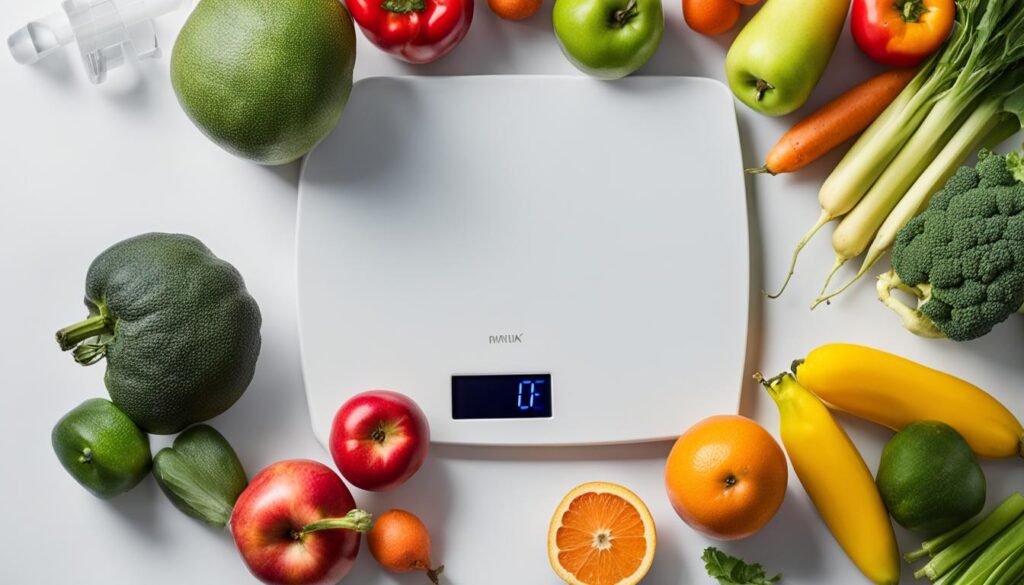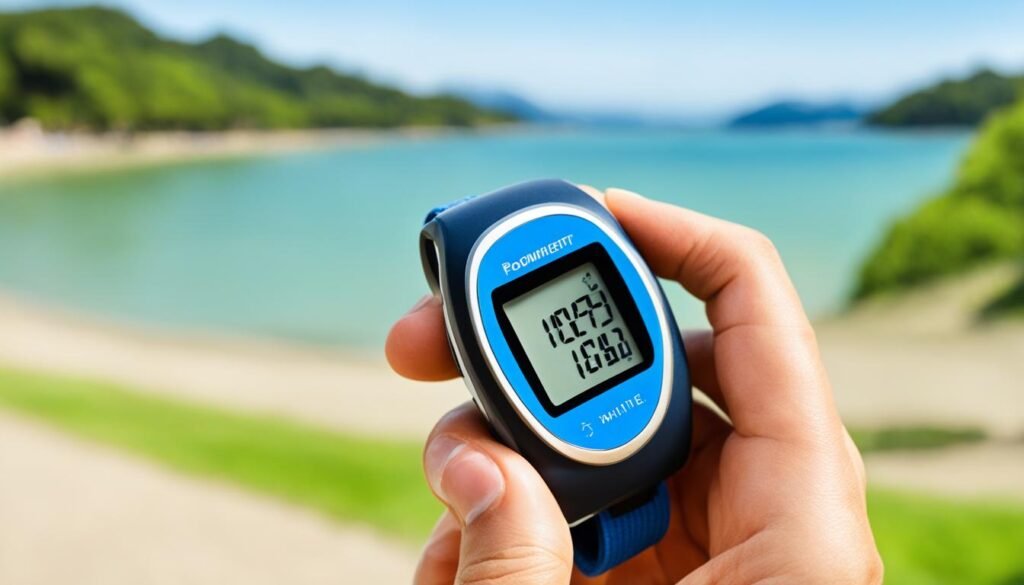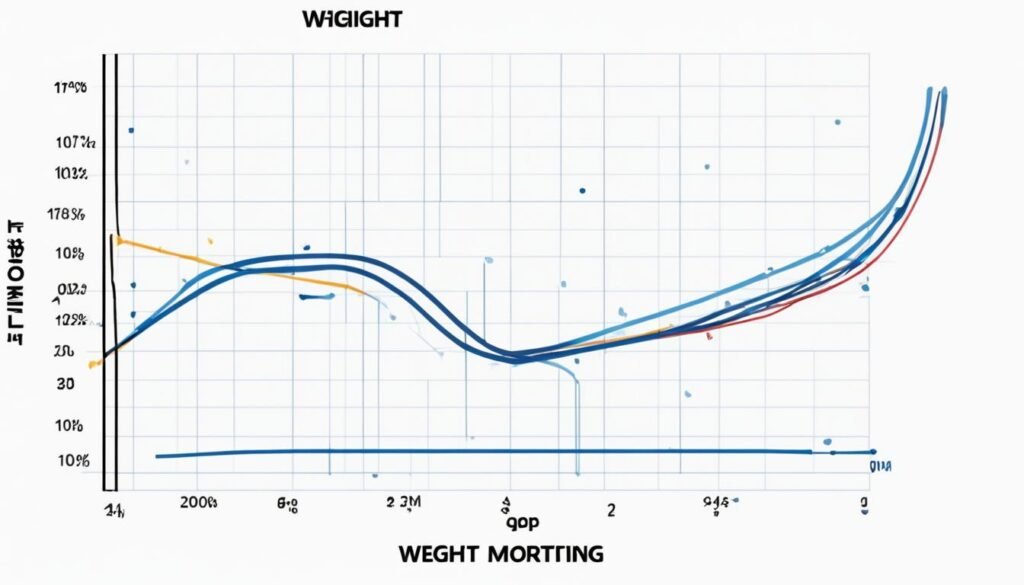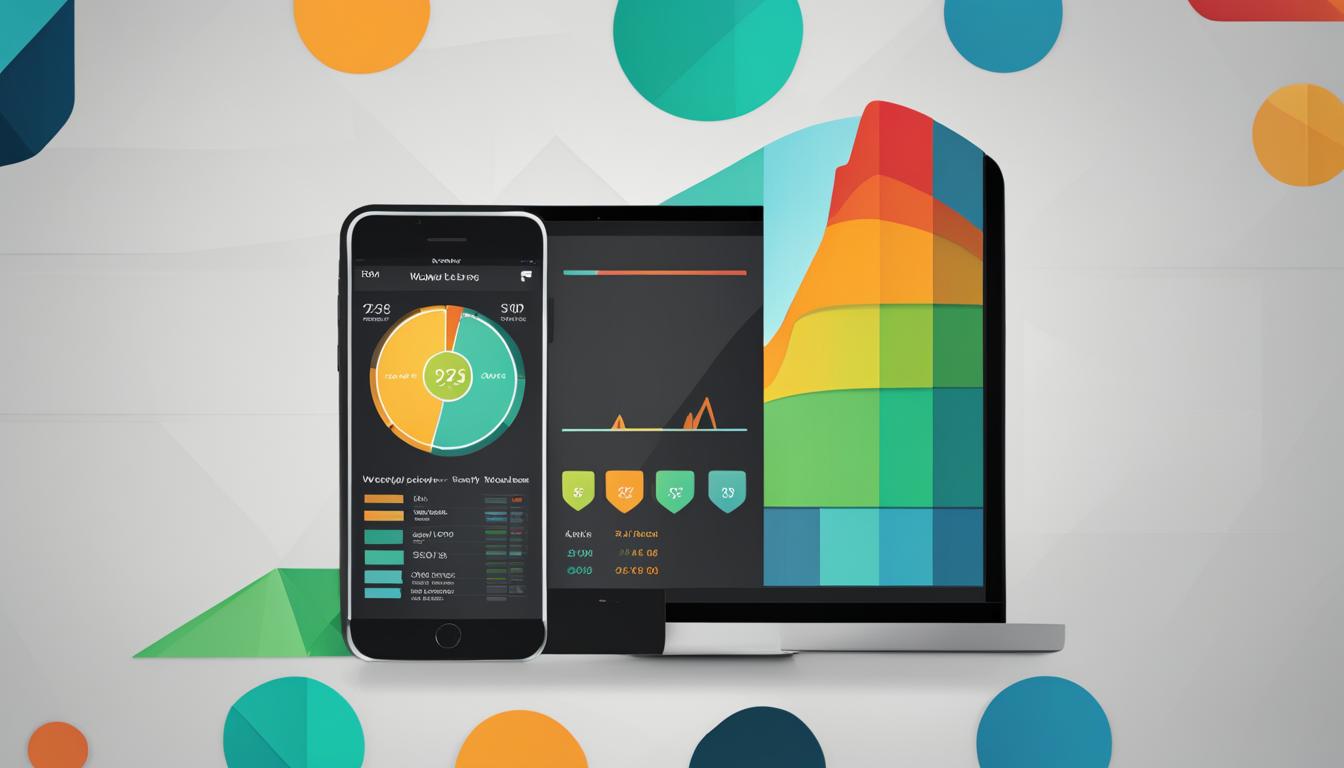When it comes to losing weight, self-monitoring plays a critical role in achieving success. Studies have shown that self-monitoring techniques for tracking weight loss progress are consistently associated with positive outcomes. Self-monitoring involves keeping track of your diet, exercise, and weight, which increases self-awareness and helps you make informed choices.
The importance of self-monitoring in weight management cannot be overstated. It serves as a powerful tool that allows you to monitor your progress and make necessary adjustments to your behaviors. By tracking your self-monitoring data, you can identify patterns, identify areas of improvement, and stay motivated on your weight loss journey.
Effective self-monitoring strategies for losing weight include keeping food diaries, using exercise logs, utilizing pedometers, and using calorie counters. These tools provide valuable information and insights into your habits and help you make better choices regarding your diet, physical activity levels, and overall lifestyle.
Key Takeaways:
- Self-monitoring is considered the centerpiece of behavioral weight loss intervention programs (see my post here).
- Self-monitoring strategies for diet, exercise, and self-weighing are consistently associated with weight loss.
- Food diaries, exercise logs, pedometers, and calorie counters are effective self-monitoring tools for weight management.
- Regular self-monitoring of behaviors and adherence to self-monitoring strategies contribute to sustained weight loss and maintenance.
- Continued self-monitoring is recommended even after achieving weight loss goals to ensure long-term success.
The Role of Self-Monitoring in Behavioral Weight Loss Programs
Self-monitoring plays a crucial role in behavioral weight loss programs. It is an essential component that promotes self-regulation, behavior change, and self-awareness. By recording and tracking dietary intake and physical activity, individuals can gain valuable insights into their behaviors and outcomes. Self-monitoring serves as a foundation for self-evaluation and self-reinforcement, enabling individuals to make informed decisions and adjustments to achieve their weight loss goals.
In behavioral weight loss programs, self-monitoring is commonly employed to track both diet and physical activity. By self-monitoring their eating habits, individuals become more conscious of their food choices, portion sizes, and overall calorie intake. This increased self-awareness helps individuals identify areas for improvement and make healthier choices. Additionally, self-monitoring of physical activity allows individuals to monitor their exercise routines, track progress, and adjust their activity levels based on their weight loss goals.
Furthermore, self-weighing has become an integral part of self-monitoring in behavioral weight loss programs. Regularly weighing oneself provides individuals with real-time feedback on their progress and helps them stay accountable to their weight loss goals. It enables individuals to identify any deviations or plateaus, allowing them to make necessary adjustments to their behaviors and maintain their motivation.
Self-monitoring in behavioral weight loss programs fosters self-awareness, which is crucial for behavior change. By regularly recording and reflecting on their behaviors, individuals can recognize patterns, triggers, and barriers that influence their eating and activity habits. This heightened self-awareness empowers individuals to develop strategies and make conscious choices to modify their behaviors and achieve sustainable weight loss.
Benefits of Self-Monitoring in Behavioral Weight Loss Programs:
- Increased self-awareness of dietary intake and physical activity
- Identification of areas for behavior change and improvement
- Real-time feedback on progress and motivation
- Accountability to weight loss goals
- Recognition of patterns, triggers, and barriers
- Ability to make informed decisions and adjustments
| Self-Monitoring Strategies | Benefits |
|---|---|
| Dietary Intake Tracking | Increased awareness of food choices, portion sizes, and calorie intake |
| Physical Activity Monitoring | Ability to track progress, adjust activity levels, and optimize weight loss efforts |
| Regular Weighing | Real-time feedback on progress, motivation, and early identification of plateaus |
Self-monitoring is a powerful tool in behavioral weight loss programs that empowers individuals to take control of their behaviors and achieve sustainable weight loss. By facilitating self-regulation, behavior change, and self-awareness, self-monitoring lays the foundation for long-term success.
Types of Self-Monitoring Techniques

Various self-monitoring techniques can be used for weight management. These techniques include food diaries, self-weighing, exercise logs, pedometers, and calorie counters.
Food Diaries: Food diaries are one of the most common self-monitoring strategies. They involve recording food and beverage intake, providing individuals with a clear picture of their dietary habits.
Self-Weighing: Self-weighing is widely utilized for tracking progress in weight management. Regularly stepping on a scale allows individuals to monitor their weight changes over time and assess the effectiveness of their weight loss efforts.
Exercise Logs: Exercise logs help individuals monitor their physical activity levels and exertion. By recording the duration, type, and intensity of exercises, individuals can track their fitness progress and make adjustments to their exercise routines accordingly.
Pedometers: Pedometers provide objective data on the number of steps taken each day. This self-monitoring tool is particularly useful for tracking physical activity and encouraging individuals to increase their daily steps, ultimately promoting weight management.
Calorie Counters: Calorie counters assist individuals in tracking their calorie intake. These handheld devices allow individuals to record and monitor the caloric content of the foods and beverages they consume, helping them make informed choices and achieve their weight management goals.
By utilizing these self-monitoring techniques, individuals can increase self-awareness, foster behavior change, and enhance their ability to manage their weight effectively.
Food Logs and Diaries for Self-Monitoring
Food logs and diaries are valuable tools for self-monitoring and tracking dietary intake. By recording what and when we eat or drink, we gain valuable insights into our nutrition habits and calorie intake. Food logs provide a basic overview of our daily consumption, including the type, amount, and caloric content of the meals. On the other hand, food diaries offer a deeper understanding of our behavioral and psychological aspects of eating, such as stress levels, mood, and environmental triggers.
With the rise of technology, online platforms and mobile apps have made it easier than ever to track and record our food intake. These convenient tools allow us to log our meals wherever we are, providing a seamless experience for nutrition tracking on the go. By consistently maintaining food logs or diaries, we can identify trends, detect patterns, and make informed decisions about our eating habits.
Self-monitoring our nutrition in this way not only helps us stay accountable but also promotes self-awareness and mindfulness when it comes to our dietary choices. It allows us to make adjustments and improvements based on our goals and preferences. By keeping a detailed record of our food intake, we empower ourselves to take control of our calorie intake and make better-informed decisions about our nutrition.
In addition to facilitating personal accountability, food logs and diaries also serve as a useful resource when seeking guidance from healthcare professionals or dietitians. By having a comprehensive record of our food intake, we can work collaboratively with experts to identify areas for improvement and develop personalized strategies for better nutrition habits.
See the table below for a visual comparison of food logs and food diaries:
| Food Logs | Food Diaries |
|---|---|
| Basic account of daily intake | Detailed information on eating habits |
| Type, amount, and caloric content recorded | Psychological and behavioral aspects captured |
| Provides a snapshot of overall nutrition | Allows for exploration of emotional triggers |
When using food logs or diaries, it’s important to be consistent and accurate in our record-keeping. This way, we can trust the data we collect and draw meaningful insights from our self-monitoring efforts. Whether using pen and paper or digital tools, the key is to find a method that works for us and supports our goals.
Embracing Technology for Nutrition Tracking
Technology has revolutionized the way we approach self-monitoring, offering a plethora of online platforms and mobile apps designed specifically for nutrition tracking. These digital tools streamline the process of recording and analyze our food intake, making it easier than ever to track our calorie intake and make informed decisions about our nutrition.
Whether we prefer scanning barcodes, searching food databases, or manually inputting our meals, these apps provide convenience, accuracy, and a wealth of information at our fingertips. They can also provide personalized recommendations, track progress over time, and even offer insights into the nutritional composition of our meals.
With a range of features and capabilities, these platforms empower us to take greater control of our nutrition and make well-informed decisions about our eating habits. They can be highly beneficial tools for those seeking to optimize their calorie intake, improve dietary choices, or achieve specific health and wellness goals.
In conclusion, food logs and diaries are effective self-monitoring techniques for tracking and analyzing our dietary intake. By regularly recording our meals, we gain valuable insights into our nutrition habits and make informed decisions about our calorie intake. Coupled with the convenience of online platforms and mobile apps, these self-monitoring tools empower us to take charge of our nutrition and work towards our wellness goals.
Importance of Regular Weighing

Regular weighing is a fundamental aspect of successful weight management through self-monitoring. By monitoring our weight regularly, we gain valuable insights into our eating and physical activity habits, allowing us to make informed adjustments. Here’s why regular weighing is an integral part of effective weight management:
- Tracking Progress: Weighing ourselves on a weekly basis, preferably using the same scale, helps us track our progress over time. It provides us with a tangible representation of our efforts and helps to motivate us to stay on track towards our weight loss or maintenance goals.
- Identifying Adjustments: By recording our weekly weights, we create a visual record that allows us to identify any deviations from our intended weight management plan. If we notice any fluctuations, we can investigate the potential causes, such as changes in our dietary habits or exercise routine, and make adjustments accordingly.
- Visual Feedback: Writing down our weekly weights provides us with visual feedback that can be incredibly motivating. We can use this feedback to celebrate our progress or to identify areas where we may need to improve our self-monitoring habits or adjust our behaviors to continue progressing towards our weight management goals.
“Regular monitoring of weight is crucial for weight maintenance after losing weight.”
The Role of Self-Monitoring in Weight Management
In the process of weight management, self-monitoring plays a critical role in helping us stay accountable and make informed choices. Regular weighing is just one aspect of a comprehensive self-monitoring strategy. In addition to weighing ourselves, we can incorporate other self-tracking techniques, such as food diaries and exercise logs, to gain a holistic understanding of our behaviors and progress.
Benefits of Regular Weighing
| Benefits | Description |
|---|---|
| Track Progress | Regular weighing allows us to monitor our progress over time, helping us stay motivated. |
| Identify Adjustments | By recording our weights, we can identify any deviations and make necessary adjustments to our behaviors. |
| Visual Feedback | Writing down our weights provides visual feedback, allowing us to celebrate progress and identify areas for improvement. |
Benefits of Exercise Logs
![]()
Exercise logs are a valuable tool for self-monitoring physical activity and tracking fitness progress. By documenting your exercise routines, you can gain valuable insights into your workout patterns, set achievable goals, and make informed decisions to improve your overall fitness.
Exercise logs provide a systematic way to record essential details of your workouts. This includes the duration, type, and level of exertion of each exercise session. By keeping track of these factors, you can easily track your progress over time and identify areas for improvement.
One key aspect of exercise logs is the ability to capture the level of perceived exertion. This subjective measure helps you understand how hard you’re working during each activity. It allows you to gauge the intensity of your workouts, monitor your calorie burn, and assess the cardiovascular impact of your exercises.
Logging your exercise routine serves more than just a record-keeping purpose. It also provides positive feedback and motivation. When you see your efforts documented and realize how far you’ve come, it reinforces your commitment to maintaining an active lifestyle.
Furthermore, exercise logs act as a reminder to incorporate physical activity into your daily routines. Whether it’s going for a walk, hitting the gym, or trying a new workout class, having a log keeps exercise at the forefront of your mind. This consistent self-monitoring can contribute to building a regular exercise routine and making fitness a priority in your life.
When using exercise logs, it’s important to start with achievable goals and gradually increase the duration or intensity of your workouts. This incremental approach allows you to maintain motivation and avoid burnout. By setting realistic targets and tracking your progress, you can continuously challenge yourself and strive for new fitness milestones.
The Benefits of Exercise Logs:
- Helps track the duration, type, and level of exertion of exercises.
- Captures the level of perceived exertion for calorie burn and cardiovascular impact.
- Provides positive feedback and motivation for maintaining an active lifestyle.
- Serves as a reminder to incorporate physical activity into daily routines.
- Assists in setting achievable goals and gradually increasing exercise duration.
Using Pedometers for Self-Monitoring

Pedometers are simple and effective tools for self-monitoring physical activity, particularly walking. They provide objective data on the number of steps taken throughout the day. Research suggests that aiming for 6,000-10,000 steps per day can help with weight loss and overall health. Pedometers encourage individuals to find ways to incorporate more steps into their daily routines, such as taking the stairs or walking instead of driving short distances.
By using a pedometer, you can keep track of your step count and monitor your progress over time. It serves as a visual reminder of your physical activity levels and motivates you to meet your daily step goals. Incorporating more walking into your routine not only helps with weight management but also improves cardiovascular health and boosts overall fitness.
Whether you’re aiming to lose weight or simply maintain a healthy lifestyle, pedometers offer a practical and convenient way to self-monitor your physical activity. By keeping track of your steps, you can stay accountable to yourself and make necessary adjustments to achieve your fitness goals.
Benefits of Using Pedometers:
- Objective data: Pedometers provide accurate and measurable information about your physical activity levels, giving you a realistic view of your daily steps.
- Self-awareness: Monitoring your steps helps you become more aware of your daily activity patterns and encourages you to be more mindful of your physical movement.
- Motivation: Setting step goals and striving to achieve them can be motivating and make physical activity more enjoyable.
- Fitness tracking: Pedometers allow you to track your progress over time and see improvements in your step count, helping you stay motivated and committed to your fitness journey.
- Behavior change: By using a pedometer, you can identify opportunities to increase your physical activity throughout the day, such as taking the scenic route or going for a walk during lunch breaks.
Incorporating a pedometer into your self-monitoring routine can be a game-changer in your fitness journey. It provides valuable information, keeps you accountable, and helps you stay motivated to achieve your physical activity goals. Whether you’re aiming for weight loss or overall health improvement, using a pedometer can enhance your self-monitoring practice and support your long-term success.
Hand-held Calorie Counters for Self-Monitoring

When it comes to self-monitoring calorie intake, hand-held calorie counters are a game-changer. These convenient devices allow individuals to effortlessly track and record the caloric content of foods and beverages consumed, providing valuable insights into their nutritional intake.
But hand-held calorie counters offer more than just calorie tracking. Many of these devices are equipped with advanced features that enhance the self-monitoring experience. Some connect to online platforms, providing real-time updates and access to extensive nutrition databases. This integration of technology allows individuals to make informed food choices based on accurate and up-to-date nutrition information.
For individuals who are constantly on the go, hand-held calorie counters are particularly helpful. Their portable nature enables users to easily carry them in their pocket or purse, ensuring that self-monitoring can be done anytime, anywhere.
The Benefits of Hand-held Calorie Counters:
- Accurate calorie tracking: Hand-held calorie counters provide precise caloric information, empowering individuals to make informed decisions about their food choices and portion sizes.
- Access to nutrition databases: Many devices have built-in nutrition databases that contain extensive information about various foods and beverages, making it easier for users to track their caloric intake.
- Convenient and portable: Hand-held calorie counters are compact and portable, allowing individuals to carry them wherever they go. This convenience ensures that self-monitoring can be seamlessly integrated into daily routines.
- Real-time updates: With the ability to connect to online platforms, hand-held calorie counters provide real-time updates on nutritional information. This ensures that individuals have the most accurate and up-to-date data available.
Overall, hand-held calorie counters are valuable tools for self-monitoring calorie intake. They provide individuals with the means to track their nutrition accurately, make informed food choices, and achieve their weight management goals.
A Comparison of Hand-held Calorie Counters
| Calorie Counter | Features | Price |
|---|---|---|
| Brand A Calorie Counter | – Built-in nutrition database – Online platform integration – Sleek and user-friendly design |
$49.99 |
| Brand B Calorie Counter | – Large LCD screen – Customizable food database – Wireless syncing with smartphones |
$79.99 |
| Brand C Calorie Counter | – Barcode scanning feature – Voice recognition technology – Water-resistant and durable |
$69.99 |
The Impact of Frequency, Consistency, and Comprehensiveness in Self-Monitoring

When it comes to self-monitoring for weight change and maintenance, the frequency, consistency, and comprehensiveness of records play important roles. Let’s explore how each factor contributes to successful self-monitoring and weight management.
The Importance of Self-Monitoring Frequency
High self-monitoring frequency has been linked to reduced weight regain. Consistently tracking one’s behaviors allows for greater awareness and accountability. It helps individuals stay on track and make necessary adjustments to their diet, exercise, and overall lifestyle. The more frequently you self-monitor, the better equipped you are to manage your weight.
The Moderating Role of Self-Monitoring Consistency
Consistency is key when it comes to self-monitoring. Studies suggest that self-monitoring at least three days per week yields the most positive effects on weight change.
Being consistent with self-monitoring practices ensures that you capture a representative picture of your behaviors. It helps identify patterns, triggers, and areas for improvement. Regular self-monitoring provides the feedback needed to adjust your approach and stay on the path to success.
The Impact of Self-Monitoring Comprehensiveness
While frequency and consistency are crucial, the comprehensiveness of self-monitoring records does not significantly impact weight change. It’s more important to capture the key aspects of your behaviors rather than obsess over every detail.
For example, monitoring your caloric intake, physical activity, and weight can provide a holistic view of your progress. Comprehensiveness allows you to identify trends and areas where you may need to make adjustments. However, it’s essential to strike a balance and not become overwhelmed by tracking every minute detail.
The Role of Adherence to Caloric Intake Goals
Adherence to daily caloric intake goals partially mediates the relationship between self-monitoring and weight regain. Self-monitoring helps create awareness of your calorie consumption and promotes adherence to your goals. By diligently tracking your intake, you can make informed decisions and maintain a caloric deficit for weight loss or maintenance.
Overall, a combination of high self-monitoring frequency, consistency, and adherence to caloric intake goals leads to the most favorable outcomes in weight change and maintenance.
| Self-Monitoring Factor | Impact on Weight Change and Maintenance |
|---|---|
| Frequency | Reduced weight regain |
| Consistency | Positive effects on weight change (at least three days per week) |
| Comprehensiveness | No significant impact on weight change |
| Adherence to Caloric Intake Goals | Partially mediates the relationship between self-monitoring and weight regain |
Effective self-monitoring allows for meaningful insights into your behaviors and progress. By monitoring your self-monitoring frequency, consistency, and comprehensiveness, you can optimize your weight management journey and achieve long-term success.
The Contribution of Self-Monitoring to Long-Term Weight Management

Self-monitoring plays a crucial role in long-term weight management (check this post out). As the cornerstone of behavioral weight loss treatment, it enables individuals to track and evaluate their behaviors, making informed decisions for sustained weight loss and maintenance.
By regularly self-monitoring their dietary intake, physical activity, and weight, individuals can gain self-awareness and make adjustments to their behaviors as needed. This process fosters adherence to self-monitoring strategies, which is essential for achieving long-term success in weight management.
While the specific components of self-monitoring that impact weight change may vary from person to person, the overall effect is positive. Self-monitoring serves as a constant reminder of one’s goals and progress, reinforcing positive behaviors and identifying areas that require improvement.
It is crucial to continue self-monitoring even after achieving initial weight loss goals. Long-term weight management requires ongoing self-monitoring to maintain good habits, identify potential relapses, and prevent weight regain.
By integrating self-monitoring as a behavioral strategy in weight management programs, individuals can develop a deeper understanding of their behaviors and make meaningful changes for a healthier lifestyle.
Self-monitoring is a key factor in ensuring adherence to behavioral strategies, which are vital for long-term weight management success. Regular self-monitoring complements other essential components such as goal setting, problem-solving, and social support, creating a comprehensive approach to weight management.
By tracking their behaviors and progress, individuals can make informed decisions, identify areas of improvement, and stay motivated on their weight management journey.
Conclusion
In conclusion, self-monitoring is a vital component of weight management programs. It plays a crucial role in helping individuals achieve weight loss success and maintain their progress over the long term (check out my post on weight loss success here). By increasing self-awareness and providing a means to track progress, self-monitoring enables individuals to make necessary adjustments to their behaviors and stay on track.
Effective self-monitoring techniques such as food logs, exercise logs, pedometers, and calorie counters can facilitate the process. These tools provide valuable information and feedback, allowing individuals to monitor their dietary intake, physical activity levels, and overall progress more effectively.
The frequency and consistency of self-monitoring are key factors in driving weight change. Regular and consistent self-monitoring of diet, exercise, and weight has been consistently associated with successful weight loss outcomes. While the comprehensiveness of self-monitoring records may have minimal impact, regular self-monitoring remains an essential tool for achieving and maintaining weight loss goals.
Incorporating self-monitoring as a behavioral strategy in weight management programs can significantly enhance outcomes. By leveraging self-monitoring techniques, individuals can take control of their weight management journey and make informed decisions to support their long-term success.




